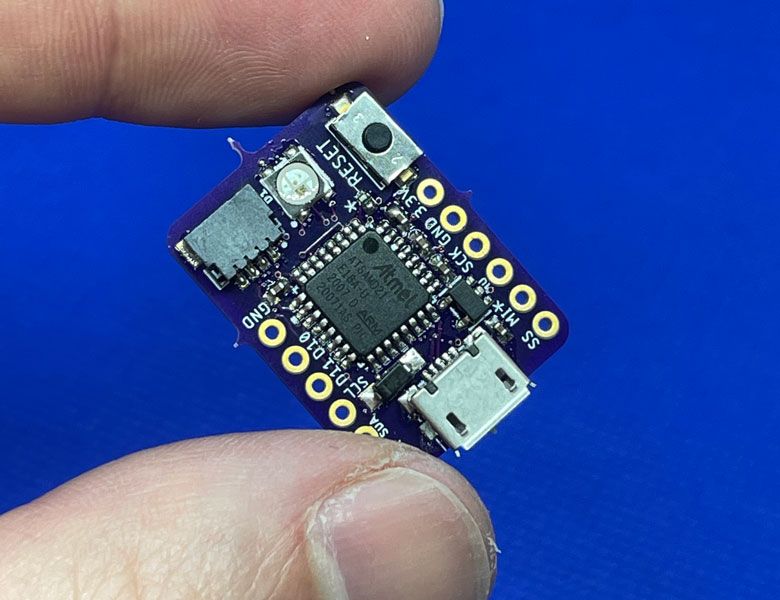CP Sapling M0
by Oak Development Technologies

Finally, a tree that runs CircuitPython? YEP! Now you can get working in CircuitPython fast with our new CircuitPython compatible development board featuring the popular Microchip AT SAM D21 microcontroller.
Providing quick and easy access to SPI and I2C (pins + Stemma/Qwiic connector) so you can get your project off the ground in no time.
This board also comes with the SOIC-8 pads available on the bottom of the board to enable it to expand storage with SPI FLASH!
- ATSAMD21E18 32-bit Cortex M0+ - 48 MHz 32 bit processor with 256KB Flash and 32 KB RAM
- Native USB supported by every OS - can be used in CircuitPython as USB serial console, MIDI, Keyboard/Mouse HID, even a little disk drive for storing Python scripts.
- Can be used with CircuitPython (Arduino coming soon!)
- Built in BIG 3535 RGB NeoPixel LED
- 8 GPIO pins:
- 2 x 12-bit analog inputs (SDA/SCL do not have analog inputs)
- 8 x PWM outputs
- Hardware I2C port with STEMMA QT plug-n-play connector
- Hardware SPI
- 3.3V regulator with 500mA peak output
- [Optional SOIC-8 SPI Flash chip on bottom]
- Reset switch for starting your project code over or entering bootloader mode
Contribute
Have some info to add for this board? Edit the source for this page here.
CircuitPython 9.2.1
This is the latest stable release of CircuitPython that will work with the CP Sapling M0.
Use this release if you are new to CircuitPython.
Built-in modules available: analogio, array, board, builtins, busio, busio.SPI, busio.UART, collections, digitalio, math, microcontroller, neopixel_write, nvm, os, pwmio, rainbowio, random, rotaryio, rtc, storage, struct, supervisor, sys, time, touchio, usb_cdc, usb_hid, usb_midi
Features: STEMMA QT/QWIIC, Breadboard-Friendly
Absolute Newest
Every time we commit new code to CircuitPython we automatically build binaries for each board and language. The binaries are stored on Amazon S3, organized by board, and then by language. These releases are even newer than the development release listed above. Try them if you want the absolute latest and are feeling daring or want to see if a problem has been fixed.
Previous Versions of CircuitPython
All previous releases of CircuitPython are available for download from Amazon S3 through the button below. For very old releases, look in the OLD/ folder for each board. Release notes for each release are available at GitHub button below.
Older releases are useful for testing if you something appears to be broken in a newer release but used to work, or if you have older code that depends on features only available in an older release. Otherwise we recommend using the latest stable release.
Update UF2 Bootloader
Latest version: v3.15.0
The bootloader allows you to load CircuitPython, MakeCode, and Arduino programs. The bootloader is not CircuitPython. You can check the current version of your bootloader by looking in the INFO_UF2.TXT file when the BOOT drive is visible (FEATHERBOOT, CPLAYBOOT, etc.).
It is not necessary to update your bootloader if it is working fine. Read the release notes on GitHub to see what has been changed. In general, we recommend you not update the bootloader unless you know there is a problem with it or a support person has asked you to try updating it.
To update, first save the contents of CIRCUITPY, just in case. Then double-click the reset button to show the BOOT drive. Drag the update-bootloader .uf2 file to the BOOT drive. Wait a few tens of seconds for the bootloader to update; the BOOT drive will reappear. After you update, check INFO_UF2.TXT to verify that the bootloader version has been updated. Then you will need to reload CircuitPython.
